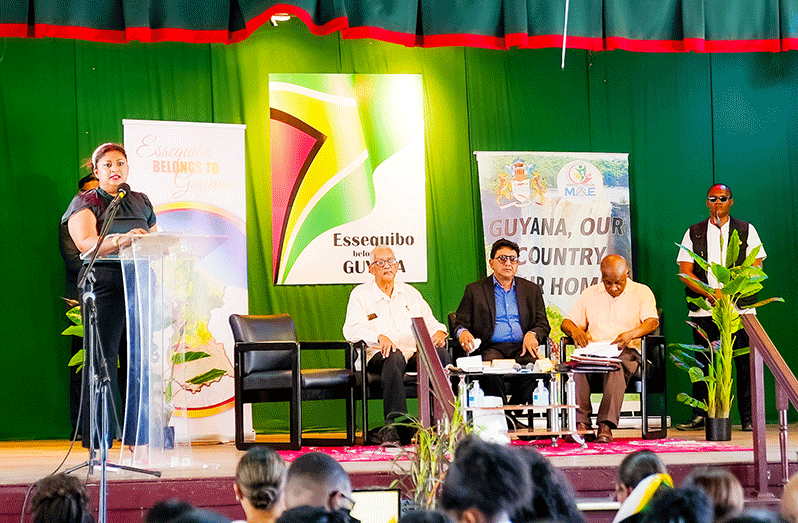THE government, through the Ministry of Education, will be spearheading an unprecedented initiative to reform the curriculum to equip the nation’s youth with the tools to comprehend, articulate, and actively support the nation’s position on the border controversy.
Minister of Education, Priya Manickchand, highlighted this approach during a Panel Discussion and Public Awareness Session held at the Bishops’ High School, on Friday.
The three distinguished panellists included Attorney-General Anil Nandlall, S.C.; Guyanese Academic, Dr. Mark Kirton, and former Minister of Foreign Affairs and Guyana’s agent in the ongoing border controversy case before the ICJ, Carl Greenidge.
Minister Manickchand, who was the moderator, revealed an extensive plan aimed at not just informing but actively engaging every facet of the nation’s education system.
This initiative, she said, signals a pivotal moment in the nation’s history, with the education sector taking the lead in navigating a geopolitical challenge that has lingered for over a century.
“This morning (Friday), the Ministry of Education sent out to every school public and private activities we expect the children, the learners, teachers, the entire school community, parents of those learners and guardians to undertake within the next week but particularly next Friday,” Minister Manickchand said.
The educational activities include a variety of creative expressions, such as poems, drawings, acrostics, and stories related to the Guyana-Venezuela Border Controversy.
Additionally, maps for colouring have been distributed to engage the younger generation in understanding geographical aspects associated with the Essequibo region.
Minister Manickchand highlighted the historical significance of this initiative, noting: “After over 100 years, I think it’s the first time the Guyanese education system is responding to a live issue on the Guyana/Venezuela controversy regarding Essequibo.”

However, the minister pointed out that this is just the beginning, revealing plans to reform the curriculum extensively.
The proposed changes will incorporate learnings about Guyana’s position on the border controversy, spanning from nursery to secondary and even post-secondary education.
“That is the beginning. Our curriculum will be reformed…very, very shortly,” Minister Manickchand affirmed.
COLLECTIVE RESPONSIBILITY
The minister urged collective responsibility, employing the “each one, teach one” philosophy.
She called on individuals to share their knowledge with at least five peers of their age and five individuals older, stressing the principle that “to whom much is given, much is required.”
“What is required of you going forward from today? You will be required to sign resolutely and firmly declaring that Essequibo belongs to Guyana and taking every action that is necessary to make sure that is a reality,” Minister Manickchand declared.
|
Addressing the audience, she urged them to remain vigilant and united, noting: “We’re going to have to ask you to be vigilant, to be alert, to be sensible and measured to resist any kind of action that would place you in the category of bullies.
“To resist any kind of action that would place you in the category of being a backward, xenophobic human being. To resist any kind of action that would place you into the category of panicking unnecessarily.”
Manickchand acknowledged the prevalence of misinformation on social media and encouraged citizens to be responsible by dispelling such misinformation and fostering a sense of patriotism.
She reaffirmed that these educational initiatives aim to equip individuals with accurate information to counteract any unwarranted fear or hysteria.
The minister highlighted that the educational session covered a spectrum of topics related to the border controversy, delving into its historical, social, political, economic, and legal dimensions.
Minister Manickchand expressed confidence in the Guyanese people’s ability to navigate this “challenging situation.”
She pointed out that Guyanese need to reinforce a collective commitment to national sovereignty and unity.
The Attorney General welcomed this move, adding that it aligns with the imperative to equip future generations with comprehensive knowledge about the nation’s historical and geopolitical context.
Amidst the approaching December 3 referendum in Venezuela, Nandlall said that Guyana must brace itself for an extended and potentially heightened phase in the ongoing Guyana-Venezuela border controversy.
“While the court deliberates, Venezuela’s stance may evolve, but the core of this issue will likely persist. We must match their historical teaching efforts and educate our present and future generations,” Nandlall said.
He said that since the 60’s Venezuela has been actively promoting awareness of the territorial controversy with Guyana.
This is done particularly through educational materials and patriotic reggaeton and videos. Venezuelan textbooks contain maps that depict a larger Venezuela, including a substantial portion of Guyana, reflecting the country’s claim to the Essequibo region.
This issue is also being incorporated into the schools’ curriculum, ensuring that students are aware of the dispute from a young age.
“We have to continue to educate ourselves. They have been teaching it in their schools since the 60s, perhaps we should address our minds by doing that.
“So, these are things that we have to do going forward so that you, our future generations, can become even more knowledgeable and educated than us dinosaurs,” Nandlall said.
He stressed the importance of sustained efforts to fortify the nation’s position on the Essequibo region, reiterating, “Essequibo is ours, and we will stay the course resolutely.”
Nandlall pointed out that educational reform is necessary since it aligns with the imperative to equip future generations with comprehensive knowledge about the nation’s historical and geopolitical context.



.jpg)










